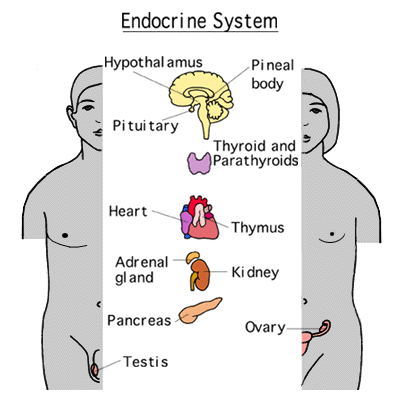In this section
Anatomy of the endocrine system

Hypothalamus
The hypothalamus is located in the brain, near the optic chiasm. It secretes hormones that stimulate or suppress the release of hormones in the pituitary gland, in addition to controlling water balance, sleep, temperature, appetite and blood pressure.
Pineal body
The pineal body is located below the corpus callosum, a part of the brain. It produces the hormone melatonin.
Pituitary
The pituitary gland is located at the base of the brain. No larger than a pea, the gland controls many functions of the other endocrine glands.
Thyroid and parathyroids
The thyroid gland and parathyroid glands are located in front of the neck, below the larynx (voice box). The thyroid plays an important role in the body's metabolism. Both the thyroid and parathyroid glands also play a role in the regulation of the body's calcium balance.
Thymus
The thymus is located in the upper part of the chest and produces T-lymphocytes (white blood cells that fight infections and destroy abnormal cells).
Adrenal gland
The pair of adrenal glands are located on top of both kidneys. Adrenal glands work hand in hand with the hypothalamus and pituitary gland.
Kidney
The pair of kidneys are located near the middle of the back, just below the rib cage. The kidneys process the blood to sift out waste products and extra water. This waste and extra water becomes urine, which is stored in the bladder.
Pancreas
The pancreas is located across the back of the abdomen, behind the stomach. The pancreas plays a role in digestion, as well as hormone production.
Ovary
A female's ovaries are located on both sides of the uterus, below the opening of the fallopian tubes (tubes that extend from the uterus to the ovaries). In addition to containing the egg cells necessary for reproduction, the ovaries also produce estrogen and progesterone.
Testis
A male's testes are located in a pouch that hangs suspended outside his body. The testes produce testosterone and sperm.
What are hormones?
Hormones are chemical substances created by the body that control numerous body functions. They actually act as "messengers" to coordinate functions of various body parts. Most hormones are proteins consisting of amino acid chains. Some hormones are steroids, fatty cholesterol-produced substances. Functions controlled by hormones include:
- Activities of entire organs
- Growth and development
- Reproduction
- Sexual characteristics
- Usage and storage of energy
- Levels of fluid, salt and sugar in the blood
